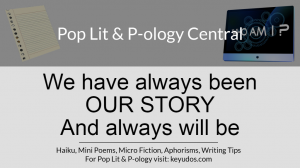
The pen is mightier than the sword, we’re told. I’d go further: the story creates the sword.
You just have to look at the despicable stories about the Jews, and the terrible reality created by the Holocaust, to realize this truth.
Yet still we do not understand the power of the story. Well, hopefully this page will allow understanding.
Indeed, this is why I wrote ‘unlocking the door OF opportunity & success’ rather than ‘to’. The door is in the mind, through the stories we believe. Open the mind and the door will open for all.
*****
Prior to every page of humanity came the story, creating history itself – for history is a novel and we, its characters.
Once we understand this, our stories can become unifying, leading to a better world, for the story can also banish the sword.
And this is how important Pop Lit & P-ology can be.
I may use catcphrases such as ‘forget pouty pics with big noses – write a word selfie instead,’ but beyond the fun is a mission.
To paraphrase one famous Prophet, it will allow us to: turn the other page.
The pen is, indeed, mightier than the sword – and so is the iPhone.
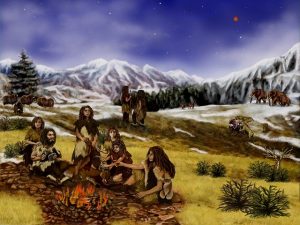
The First Stories
This is the story of the story. From its inception around the camp fire in prehistory, to the implications of storytelling in cyberspace, the story has been with us, and I narrate its progression here. In doing so, I hope to show that storytelling is at the heart of what it is to be human. For as I will show, the story is at the centre of our aspirations and meaning, and as such the story has been the central element of our history.
The story is at the heart of who we are as individuals, as societies, as cultures. Above all other areas of life our ability to tell stories divorces us from the animal kingdom. At the heart of the story is human imagination and the ability to think in the abstract, and it is this ability that allowed us to rise from the animal in the first place. So, once upon a time …
When did the story begin? From studies of primitive tribes today we can argue that the story began with bluster around the ancient camp fire. Someone would do something brave or ingenious and men of imagination would sit there, the flickering flames upon their face, and embellish the exploit. The purpose of such stories was clear. In one sense, it entertained, drawing back the dark to deliver a fantasy that enriched life. One obvious upshot of such tales was that it would imbue others to follow the path of the hero, thus making the tribe more thrusting, ingenious and dynamic. But there would be other purposes involved in the story.
One obvious purpose was the taboo. Man, the individual, has wants and desires. But in order for a society to exist, such desires must be suppressed. A society where everyone got what they wanted would be chaotic and incapable of advancement. Hence, a code of ethics must come into being. And there is no better form of moral expression than the story, where the transgressor gets his just desserts.
The obvious social reaction to such morality tales would be the rise of superstition. A story births an idea, and to transgress soon brings a general punishment. And you can guarantee that that punishment will be as the story advised. But in the inevitability of cause following an effect, the story takes on a life of its own. But what form of life is this thing called fiction?
A superstitious society is a spiritual society, and as the story grew, so would the idea that it represents some supernatural world. After all, haven’t the heroes of the story taken on almost supernatural status? And it is in this dimension that the earliest stories went on to define, more than anything else, what society rose to become.
The first known religions were those related to animism. In its basic form, animism was the belief that parallel to the physical world was a supernatural world of spirit. Hence, everything that was physical – the tree, the river, the storm – had a spirit equivalent. The ability of the human mind to dream could have laid the basis for such a perceived phenomenon, but without a doubt it was the story that embellished and defined the idea. It was in the story that a reason for disaster was put down to a god, angered by human behaviour.
This was the birth of religion proper. Centred round man’s relationship to nature, the story anchored human society into a moral code, based around place and environment. It was the beginning of culture, giving man and his society a meaning above mere survival. And in defining culture, it was the story that propelled man into history, giving him the ingenuity and the reason to strive. And in gratitude, the storyteller was destined to become the shaman, or priest, building the bridge between the physical and the spirit.
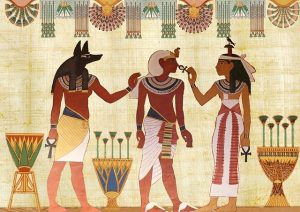
Storytelling and Myth
The story arose around the camp fires of primitive man, giving him meaning and anchoring him to his society and environment. It was to be the birth of religion, and confirmed a priestly caste which held, in its power, the soul of the people. But was the story to become even more important than this?
At the root of the societies that propelled themselves into history was mythology. The original storytellers had told of brave warriors and how they were guided by animal spirits. The people who listened to such tales were hunter/gatherers, but as the Agricultural Revolution came about 10,000 years ago, a new form of story was required.
The new agricultural society was different. It was static, it required buildings, defences and specialized tradesmen. In turn, this required social hierarchy and complication. And it was inevitable that this would only come about with a meaning in doing so.
Essential to such societies was the need for coordination within a strong leadership. A priestly class had already arisen to confirm the stories of their past, but now leaders made a partnership with the priests. In a subtle change, the brave warrior merged with the animal spirit to be as one. This was represented, initially, by the chimera, or half man, half animal, as in the ancient Egyptian gods.
This was essential, for it tied a particular leader to a supernatural deity. Suddenly, the leader’s authority was divine, above mere man. But this was only the institution of politics in a contemporary setting. The priest’s storytelling skill was to go on to tie the leader with the past and his ancestors.
In practically all early mythologies we can see this process with the arrival of the Hero. From Gilgamesh to Osiris, you can find him at the beginning of civilization. He was the great warrior who arrived, usually with supernatural help or being supernatural himself, to save the people from adversity.
Showing great courage, he becomes leader, but then he goes on to show great wisdom, teaching society the arts of civilization such as writing, building and agriculture. At death, he becomes a god in his own right, and begins a dynasty of future leaders who speak with the authority of the gods.
Through the story, a hierarchy grasps the soul of the people and turns it into enduring politics, grasping great power for themselves. In its later, classical, form the story can be seen, with great philosophers trying to capture the soul of the people in the same way.
Typical was Plato and his creation of the myth of Atlantis. Plato was a political philosopher who envisioned a society led by philosophers. It never came about, but Atlantis is nothing more than a morality tale of what would happen to a great society that did not live by his political philosophy. The analogy was so strong that it survives in popular culture over 2,000 years later.
Such stories formed the beginnings of mythology and the beginnings of historic society. But how did they manage to take over the minds of people so easily? Perhaps the answer lies in realizing that such stories not only captured the soul of a society, but expressed its psyche.
The psychoanalyst Carl Jung realized this when he studied myths and recognized their universality. Regardless of the culture expressed, if you removed the culture from the myth, it held within it exact ‘mechanisms.’ Myths held universal symbols, which Jung called ‘archetypes.’ Such symbols could be a trait, a place, an idea, and also a type of character. Indeed, he recognized exact characterizations which he called the Child, the Mother, the Hero, the Sage, the Judge, the Trickster, etc.
How could myths, which grew separately throughout the world, hold such universal similarities? The answer became obvious. A myth held within it the traits and foibles of the human mind. In the stories told of the gods, the gods themselves acted out human dilemmas and situations. The gods themselves took on the personality traits of the person. And in this way, the storyteller got under the skin of the society, reflecting back to them an image of itself.
This was a powerful psychological weapon which the storyteller used to its full advantage. He did so with the use of allegory, showing great moral or social issues through symbolism, thus teaching the people how to behave, and the consequences of not behaving as the story demanded.
Through the storyteller, a powerful hierarchy captured the supernatural and reflected it back to the people through their mind, instituting politics, religion, and the moral requirements of social belonging.
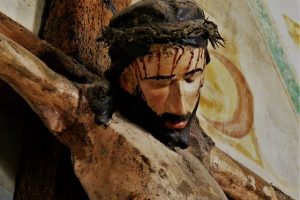
Christianity Rules, OK
We often say that the greatest intuition of man was the wheel, or the discovery of fire, but this is untrue. His greatest achievement was the story, birthed around the camp fire and leading on to politics, religion and morality, which in turn shaped society and allowed culture to rise.
Hence, it was inevitable that a time would come when the psychological and sociological factors in the story would birth ‘the greatest story ever told.’ And that story was the rise of Christianity and the life and death of Jesus Christ.
The story is told in the latter part of a single book – the Bible – and to a fundamentalist Christian it is absolutely true. Yet this absoluteness holds a problem. If God is infinite and beyond understanding, how can the finite mind of man possibly approach an understanding of Him? Hence, whilst the messages of the Bible could well hold elements of truth in human terms, the reality is that it is the peak of perfection of allegorical storytelling.
The fundamental message of the Bible is a simple one – that there is but One God. The genius of the statement was overwhelming to the people of the time, for the power of storytelling had created a multitude of pagan gods, all within their separate cults, and pulling society apart through supernatural antagonisms. In the idea of just One God, pagan gods could be banished and everyone brought into a single social system. It was the cleverest piece of politics the world has ever known.
It was immediately followed by the second. As well as there being a plethora of pagan deities to pull society apart, there was no will towards advancement in pagan society. Everything was cyclic, going back to a beginning in a never ending circle.
This was because society was grounded in nature, with religion reflecting this natural bond. In order for man to thrive through advancement, he had to be seen as above nature. Hence, in the story of Creation, man is created by God, separate to nature and given dominion over it. In the power of the story, man, himself, was empowered to thrive.
A third problem with society as it then existed was that with nature seen as primary, not enough attention was given to society itself. In pagan societies, nature’s primacy was confirmed in a contract between man and nature, overseen by the supernatural, in which man gave offerings to nature in return for nature’s abundance. This was the purpose of sacrifice. Yet in the Old Testament, sacrifice is banished and the contract between man and nature is subtly changed to a Covenant with God, where man confirmed his moral order within society as opposed to nature.
We can see, in the above, how the storyteller’s art progressed by taking old pagan themes and transferring them to a new society-based, monotheistic system. And this was to continue as the story of Jesus Christ formulated following his death.
In his partial supernatural birth, his ability to do miracles and his Resurrection, Christ confirmed all the central aspects of the previous Culture Hero who birthed a new society. The old storytelling devices had been refined, creating, at last, that ‘greatest story ever told.’ However, in his confirmation as the Son of God, a final political masterstroke was confirmed over the pagan.
Pagan society believed in a dual world of a physical realm with a supernatural realm parallel to it. In the shaman we had an early priest who bridged the two worlds, allowing the two to interact.
This was the essence of paganism, and is retained today in the Occult. However, Christ confirmed that the ability to be with the supernatural was his domain only. In communing with God, Christ was special, and mere mortals could not connect with this world until after death when they would go to the Afterlife.
This was essential for two reasons. First of all, it made those who communed with the supernatural in life evil, thus banishing paganism, the old pact of man with nature now becoming a pact with the Devil. And second, in order to experience Afterlife, you had to live within a strict Christian system in order to deserve it. Indeed, go against the Christian system and you would go to Hell.
This, then, was the Christian story that was to forge European Christendom, shackling society into a fundamental, totalitarian existence based on observance to God. Yet even here, it was the power of the story that held it all together.
In the mystery plays the life of Christ was enacted throughout Europe, confirming the rightness of the belief. The year itself was marked by the primary aspects of Christ’s life, from his birth at Christmas to his death as Easter (both, incidentally, taking over pagan festivals that celebrated the birth and death of the annual cycles of nature).
In Christianity, the power of the story was all-embracing. It had to be, for if a hierarchical system had not been in place, then society would have disintegrated once more into unbridled paganism and the chaos it would bring. This would inevitably happen because at a lower social level, the power of the story still thrived.
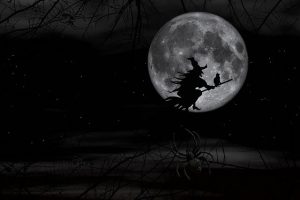
Double, Double, Toil and Trouble
The story arose from pagan beliefs in prehistory, tying a spiritual realm to the physical world. Yet in reality, it was not a spiritual realm that the storyteller tapped, but the inner workings of the human mind. And as the story went on to define culture it was inevitable that the human mind would play a large part in how society developed.
Whereas a system such as Christianity went on to use the story to control society and allow order, paganism continued to weave its stories and bring chaos. But then again, perhaps what society really needs is a balance between chaos and order, for if any one becomes supreme we have either totalitarianism or anarchy.
Paganism continued to provide the stories of life because it worked directly on the human mind, sparking man’s sense of wonder and his need for mystery and excitement. On the one hand, this led to stories celebrating great heroes and achievement, but on the other, it also celebrated the monsters and demons the heroes fought. And in such ways, supernatural cultures intertwined with physical living, allowing the continuance of shaman-like abilities as expressed in the witch. Indeed, throughout the Middle Ages, and well into modern times, the witch continued to be the central basis of folklore, which is, of course, storytelling.
This inevitably led to stories being told against the witch. Some of these arose from the Christian hierarchy, who saw witchery as a threat to Christendom, whilst others were more local based – the witch often became the ‘cause’ of illness or natural disaster. And a mixture of such causes allowed a continuance of the interference in the physical world of supernatural forces.
Our ability to tell stories thus propelled a culture of superstition, curse, ghosts and demons. But how was this achieved? Maybe it tapped already existing abilities within the human mind. We must analyze these to show how easily storytelling can actually create wonder.
Hallucination – We are told that we have an ordered mind that can rationalize problems and the world around us in order to come to balanced judgments. Should such a mental process be inhibited by fantasy, we automatically believe the sufferer to be mentally ill. And nowhere is this truer than in hallucination. Only the mad hallucinate, we say. But the reality is very different.
The mind observes the world through the senses and then interprets what it sees to offer images, in the mind, of the outside world. However, this ability to interpret images can be affected by many factors, including emotion and tiredness. When in such states, the unusual can often be interpreted in surreal form. It is as if the calibration between mind and the world has become faulty. And in such states we can all readily hallucinate.
Curse – Rational people are said to be totally in control of their actions and bodies. Superstition is a force that cannot affect them, but what such rationalists forget is the power of chance and hopelessness.
Chance automatically creates coincidences that can seem to be meaningful. When we are affected by such a run of random events, we class ourselves as lucky or unlucky. But if such events happen within a culture that believes in superstition and the curse, the meaning imposed upon the random events can be powerful indeed.
In a simplistic sense, if you felt a curse or bad luck had been put upon you, you would automatically be more careful in your actions. As such, you would not be operating as you normally did, and with such abnormal behaviour, the chance of an accident is increased.
Taking this process to its ultimate, a sense of hopelessness could take you over. Medical science knows, but tends to ignore that, due to a sense of hopelessness, the body can shut down, resulting in death. It seems, good reader, there is a reality behind the curse.
Hysteria – The rational, sane mind is said to be unable to take on board an irrational idea and become hysterical. This is absolute bunkum, as evidenced by everyone who has ever fallen in love. Your feelings and actions during intense love would, by the above measure, be classed as mental illness. Hence, if we can be affected by hysteria in one way, it is inevitable that we can be affected in other ways. And nothing is more powerful than an irrational idea concerning supernatural forces.
At its most intense, irrational ideas can pass from one mind to another, causing mass hysteria. Such a ‘mechanism’ is essential for supernatural ideas to spread, infecting a whole community to the point that effects and sightings can be seen to confirm the story being told.
On a sublime level, we activate this social force every time an audience watches a good comedian. The laughter we display is mass hysteria, based on an irrational idea – i.e. a joke. For a whole society to experience a supernatural event, the only difference is one of degree.
Possession – The supernatural is full of tales of people being possessed by demons or other supernatural entities. Yet we do not need to invoke outside forces to explain what is going on here. The human mind has specific character types which Jung called ‘archetypes.’ Such archetypes presented themselves in mythology in order to show people how they were to behave. Yet, if they exist in the mind, and are malleable to the storyteller’s craft, then it is also likely that they can manifest naturally in the mind and take on a life of their own.
This is particularly so in the psychological phenomenon known as ‘multiple personality.’ Here, the mind is said to fragment into distinct personalities that take over the mind. The way such personalities work is not much different to supposed cases of possession. But the most fascinating aspect of the phenomenon is that the severity seems to increase if treated by a therapist who believes the phenomenon to exist.
It is becoming increasingly likely that the therapist creates the phenomenon, the sufferer simply falling in line with the therapist’s beliefs. In a culture where beliefs in possession are strong, the same process could reinforce the degree of possession.
Cultural Tracking – In the above, we have looked at four abilities of mind to bend to ideas of supernatural forces, giving them a form of reality in society itself. It seems that such abilities allow individuals and societies to bend to the stories being told.
Those stories can be told for many reasons. Maybe people just want to scare others, or maybe they want revenge on someone; and as the stories apply to one person, they take a life of their own and formulate into a general type of phenomenon in society.
The processes involved, here, are essential. Consider the proof of the Resurrection of Christ. This proof came in the form of ghostly sightings, hysteria and possessions. If the processes used to confirm the supernatural had not been in place, then Christianity would never have existed as no proof of the Resurrection would have been seen.
We can see, here, that the supernatural, and the stories that lie behind it, was essential to the formulation of culture, and thus our advancement. And it is interesting to track such forces through history to see how important they really were to us.
For instance, the demons and curses said to be endemic to Medieval witchcraft eventually formulated into stories of ghosts and vampires. It is no coincidence that this occurred as man was beginning to philosophize upon his individuality. The supernatural had moved from supernatural beasts to man-beasts and memories of their dead.
Towards the end of the 19th century a phenomenon grew as powerful as witchcraft. This was Spiritualism, which included séances where hysteria and hallucination led to communication with the dead. Spiritual mediums were predominantly women, and it is no coincidence that this occurred as feminism was gaining ground, requiring women to take a bigger role in society.
As World War Two ended and science looked to the conquest of space the supernatural story changed to extraterrestrial, with the UFO and, eventually, alien abduction being the new cultural tale, feeding people’s requirements towards a new spirituality and an urge to explore the heavens.
And as if to confirm the new cultural slant on an old story, consider a person who sees a small entity who goes on to abduct them and take them to a fantasy world, and before long a form of hybrid child appears. This is seen as the classic alien abduction event, but I was describing a classic fairy abduction from the Middle Ages.
Today, we live in a material world, and it was the story that went on to define it, as we shall discover soon. But just to upset those who think the pagan story is dead, we must remember the modern phenomenon of the conspiracy theory. This is nothing more than superstition in new clothes, but whereas the force to be feared used to be supernatural, it is now malign government.
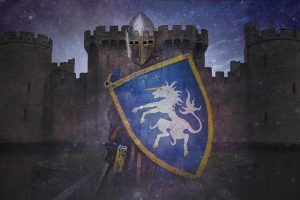
The Grail and Other Stories
The most powerful influence in storytelling has been the application of mythology, giving a society meaning through a supernatural connection. And as well as providing cohesion in society, it also permitted severe superstitious punishment against immoral behaviour. Consider, for instance, Dante’s version of Hell in his ‘Divine Comedy’. Appearing in the 14th century, it narrated his spiritual journey through Heaven, Hell and Purgatory, depicting Hell as an evil, firey place of eternal torment.
Dante’s vision was a powerful restatement of ideas of Hell built up by the Christian hierarchy in stories in order to terrify the people into Christian ways of life. And a similar use of storytelling had been applied to the Devil. In the Bible the Devil is hardly mentioned except for his tempting of Job and Christ. The stereotypical Devil with cloven hoofs and scaly skin comes from an adaptation of the Greek god Pan – yet another pagan deity to be demonized.
The genius of storytelling to reshape society by using old themes is exemplified in tales of King Arthur. If he existed, he was most likely a Celtic chieftain or Roman general who remained in Britain to fight the Saxon migrations. As we have seen, stories began to appear of Arthur in ballads written during the Dark Ages. Essentially pagan, in the 12th century, Christian writers began to take note of the tales.
Typical was Chretien de Troyes, a French poet who was fascinated by tales of the Holy Grail. Could such a powerful symbol of purity be used to define Christian society? Chretien began a tradition of writing romances based on the Grail and Knighthood. By the 15th century it had metamorphosed into Sir Thomas Malory’s ‘Morte d’Arthur,’ where we find King Arthur and the Knights of the Round Table going on quests to find the Holy Grail.
The essence of the story was a restatement of the Culture Hero of mythology, used to define Medieval courtly life, replete with chivalry and romance. At the beginning of the tale, Merlin, the pagan, is predominant. But as the story unfolds, Merlin is trapped by his own magic, the Grail taking prominence. In effect, it is a story of the fall of paganism and supremacy of the Christian virtues of duty, chastity and spirituality.
The romances of King Arthur tied politics, religion, duty and morality into a single package. Previous to their appearance, storytelling was carried out, outside the Christian ethic, in the ballad. How old the ballad is we do not know. Originally the words of songs, by Medieval times they were distributed at fairs on sheets of paper known as ‘broadsheets.’ With pagan themes, or as protests against tyranny, perhaps the most famous subject of a ballad was Robin Hood, a pagan hero fighting oppression. But with the arrival of the Grail romances, a new literary tradition had begun in the formalized story – a tradition that was to propel storytelling into the modern world.
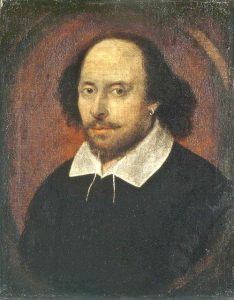
The Birth of Modern Man
Until the close of the Medieval period, storytelling was archaic, in that it didn’t really represent what it was to be modern. Typical of archaic storytelling was Homer’s ‘Iliad.’ Describing the epic siege of Troy, it identifies the taking of Helen by Paris, yet rather than a love story, it is a political move. Human feelings do not really come into it.
The epic has many heroes, such as Achilles, Agamemnon and Hector, but their vocabulary does not really involve thinking on their part. Rather, they are pawns of the gods, with humanity playing the lesser role to such dictats. Human urges seem to be missing, as if mankind is irrelevant.
What such stories lack is human personality. Yes, their primal urges may be catered for in the mentality of the gods, but the feelings do not extend downwards to the person. There is a hint of personality in some of the Biblical prophets, with human feelings occasionally placed centre stage, but nothing in terms of modernity.
The same can be said for ancient ballads and the original tales of King Arthur. Only as the Arthurian legend advanced towards the end of the Middle Ages does a new form of human personality arise. Many of the Knights seem to take on personalities, and the feelings between Guinevere and Lancelot are human.
This change in storytelling, adding real urges that can be said to be human, came in line with the intellectual revolt against a strict Christian orthodoxy. The Renaissance was soon to burst out, heralding human genius, but first there was Humanism and the idea that human affairs in this life were important, rather than life being the prelude to afterlife.
One of the first to express true humanity was the Italian poet, Petrarch. In his love poems he narrated true feelings, and even included infidelity. Soon, he was to influence one Geoffrey Chaucer, who’s ‘Canterbury Tales’ were a sudden burst of modernity. Here, we find real characters of all persuasions and with distinct personalities. Even the stories were modern, in that these characters were influenced into bizarre behaviour by their own emotions.
Soon the Renaissance was well under way and the Reformation was to break out, forming Protestantism as a protest against Catholic dogma. The power of the Church was waning in Western Europe and people were beginning to be themselves. And it was inevitable that a point would come when humanity was finally, and completely, represented in storytelling.
That moment was the arrival of one William Shakespeare. In Hamlet and Macbeth, in King Lear and in Romeo and Juliet, human personality had arrived, complete with both his base and romantic urges. Mankind was on the point of being allowed to be who he wanted to be. But it leaves a disturbing question.
We saw earlier how storytelling defined what it was to be human. Hence, it is arguably the case that as storytelling changed, it influenced what humanity was. Could we therefore say that, before Chaucer and Shakespeare, man was not human in the modern sense? If so, then storytelling CREATES what we are.
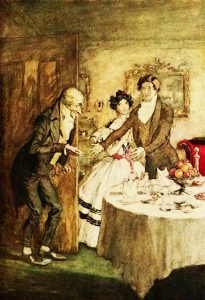
Enlightened Mind
The Reformation brought a dual system of Protestantism to Western Europe. On the one hand, a strict Puritanism appeared, but on the other, a watered down form of Catholicism allowed new freedoms of expression in the people. No longer tied to a strict Catholic doctrine as the story of their lives, a new form of media allowed a storytelling form that placed people’s urges and emotions as central to their lives.
Liberties began to be taken in drama, with individuality becoming uppermost in the story. In England, this was curtailed as Cromwell placed an austere culture on the country, but with the Restoration of the monarchy in 1660, bawdy Restoration comedies appeared. Storytelling became subversive, leaving spirituality behind and centring the story on human predicaments.
This had a massive effect on culture and society in general. In particular, religion declined further, and throughout Europe a new kind of thinker began to appear. These were the scientists and philosophers, looking at life and the universe and devising man-made laws to account for phenomena. The effect on God was severe, with His place as creator and regulator of man and the universe in decline.
The success of man’s mind, combined with new licence for representing humanity, led to perhaps the greatest storytelling device invented since the myth. This was the novel. But in the novel, we find something much more ingenious than mere myth. For the first time, meaning was no longer to be found in some supernatural authority, but in the individual mind of the author and his characters.
This cannot be overstated. The novel was, indeed, new, with individual writers having a voice in a new, secular world, where social morality was a device invested in the storyteller in human terms. And such morality was diverse.
In the novels of de Sade we found sexual and violent licence with the invention of the new word, ‘sadism;’ whilst in the novels of Jane Austen we find a new society arising, based on the middleclass, with inheritance and good marriage as all important.
This ability of the new writer to exemplify a social time is well known today, with whole periods of history being defined as Shakespearean or Dickensian. In a real sense, the novel and novelist, together with the playwright, became mainstream media. But in realizing this, we face a dilemma concerning the power of storytelling even in the modern world.
Were people really individuals, or did they still cling to the story as told by the storyteller? One interesting point to note is that the success of the novelist was not due, so much, to his brilliance, but acceptance by a consensus of the public. In this way, the story pushed society on, but only when society was happy with the message.
Hence, a mutualistic scenario can be seen in the writer/reader relationship. We could almost say that the novelist intuited a new mood in the people, but in highlighting it in the story he defined it for all to follow. And in understanding this, we must ask if the individual was really let loose, or did storytelling still impose its will on society?

Moving Pictures
With the arrival of the 20th century, storytelling moved into another sphere. Previously, the story was recounted orally or through the written word. Early on, the two forms had merged into drama, but with the arrival of moving pictures, the scope and availability of dramatic storytelling increased. In the ‘movie,’ a new magical form of storytelling was with us. But was this a good thing or a bad thing?
The beauty of the early mystery plays which paved the way for the acceptance of Christianity was that they provided perfect symbols for society to see. The ancient Greek dramatists had realized this even earlier, and in this way, drama had been a force to shape society in line with the powers-that-be. What a hierarchy wanted could be portrayed in drama, and thus becoming the way people acted and thought.
The novel had broken this hold on society. The beauty of the novel is that it was a personal experience between the writer and reader. Further, words, in themselves, are insufficient to truly provide a powerful symbol.
Hence, the novelist could only convey certain impressions to the reader. The picture could only be completed by the reader’s mind, putting mental images to what was going on. And in this way, a novel educated by forcing the reader to think about the actions, and equally about the consequences. In this sense, the novel was truly moralizing because the reader had to work such things out for himself.
In the movie, all this was to be again reversed. In the movie, there is no need for mentation; there is only concentration on the pictures, allowing the person to again be influenced by the pure picture images. Symbolism had returned to storytelling in the same way as it had been used in myth. And it is no coincidence that Hollywood eventually became a major force in the Globalization of the world.
With potent symbols of the American Dream going before it, Hollywood paved the way, culturally, for the arrival of globalization. Which prompts the question: did we ever leave the wider meanings that influenced us in the spiritual, or does the story still grip the human psyche, conditioning us to how the hierarchy wants us to be?
We can consolidate this opinion by looking to the smaller screen – the television. At the heart of globalization we have capitalism and the need for powerful companies to sell their products. If television did not influence us into actions and ideas, advertisers would not flock to the screen to advertise their products. However, drama has become much more malignant in this modern world.
In recent decades a new drama-form has become popular. This is the Soap Opera. Unlike all previous drama, there is rarely an absolute conclusion to a story because the characters are on-going. Hence, it is rare that an absolute morality is placed on a character’s actions.
In this way, morality itself is subverted – an influence made even worse by the simple fact that, in drama, a bad guy is infinitely more interesting than a boring good guy. And when we add another factor to this equation, the Soap Opera becomes the most influential drama ever created.
The success of the Christian oligarchy during the Middle Ages was due mainly to the fact that the Christian story was on-going throughout the year and daily through prayer. There was never a moment that the story was not hammered home, literally controlling a compliant population.
In the Soap Opera we have the identical mechanism at work. In becoming an almost daily drama, we become involved with the characters like never before, and as such their influence upon us becomes total. It is no coincidence that, increasingly, some people’s lives go on to ape the Soap Opera they watch, with morality diluted along the way. Soap characters are, in effect, Biblical in their power and influence.
It is arguable that this situation did not come about by accident. The success of global capitalism lies in its ability to subvert local culture by imposing a consumer free-for-all, devoid of morality. And there is no better way of subverting the reality of a previous moral story – i.e. a local religion or sense of nationhood – than by showing examples of life through a counter, but appealing, symbolism. Our supposed freedoms identified in the modern story appear to be, good reader, as enslaving as they ever were. Unfortunately, however, due to the predominance of science as the only knowledge system, this pervasive influence goes unnoticed.

The Cyber Story
Despite the modern scientific world, the story has been the most potent force in society and culture, defining who we are and how we should act and think. But could it be that modern technologies have eroded the power of the story, taking away its ability to form us?
A typical example is modern media. Images come to us from around the globe, appearing on our television, laptop, tablet or smart phone. To meet this rush of information, 24 hour news channels constantly bombard us with the ‘facts’ of what is going on. Yet you do not have to watch such a channel for long before a realization dawns. Rather than offering us news, such channels speculate as to what is happening, thus being nothing more than gossip channels. In such a media world, we do not get news, but constantly developing stories, with reality some obscure, ethereal quality which is hard to grasp.
The situation is made worse by the modern political need for spin. Politicians now tell tales to substantiate their positions. This is a further area of fiction, with new stories every day. But as is always the case, this may be simply the story continuing to express the world to which we belong.
As to that world, it is postmodern, with image more important than substance; with high and low culture mingling into one; with information being neither fact nor fiction, but a state which the sociologist Jean Baudrillard called ‘Infotainment.’ Reality has become relative to the storyteller’s skill.
Into this world we must, of course, analyze technologies such as the internet. Once upon a time, a machine was an appendage of man. Increasingly, interaction between computer and mind has formed a new form of consciousness where people can concentrate on more than one piece of information at a time, but also have a shorter overall attention span.
Such a new consciousness is technological in that we are developing a data-processing mind. Today the mind is becoming the appendage of the machine. The only problem is, with such a small attention span, information is not turned into wisdom, and moral dilemmas are no longer properly understood. The mind is no longer the arbiter of the story, but its passive receptor.
This is an ideal situation for a globalized world, where local cultures are diluted to produce a worldwide sense of sameness. It is a world where the majority does not question the world into which capitalism has taken us. But there is a sting in the tale of every good story, and the sting here could work to the advantage of society in the end.
There is a growing tradition on the internet of the conspiracy theory. In essence, this is nothing more than another form of storytelling. If we analyze what is going on in the conspiracy theory, we realize a strong sense of paranoia and a return to the idea that there are forces out to get us. This new superstition is reinforced by the idea that nothing can be trusted. Even the story itself has become interactive, where the reader can change the story to his own design.
It is technology that has allowed this – the interaction of the internet. But what medium is really being manipulated here? It is, of course, that ethereal concept of Cyberspace. But what, in essence, is Cyberspace? It is a new, undefined world parallel to the physical world – a form of techno-supernatural; a new animism.
With the internet, storytelling has come full circle, back to the beginning. We have returned to the anarchy of the camp fire tale. We have subverted history and produced a medium where new stories and new cultures are being etched. Chaos rules and everyone is on a level playing field. And out of this cauldron of imagination, a new culture will eventually form.
Personally, I hope this new culture grasps the importance of local identity, for a new world must be better than the last, and vital to our success is meaning and diversity. If people are all the same, they are nothing. Only with meaning and direction can we go on and advance.
But in formulating the new story from a globalized Cyberspace, maybe a secondary quality will be placed on who we are. Today, we live on a shrinking planet where the entire world is at our fingertips. Issues such as the environment and human rights are on the agenda, and I am sure that, as the new story forms, it will include elements of a globalized brotherhood and sisterhood, where we can live together with our differences.
At least, this is my hope. But regardless of how the new world formulates from this ‘supernatural’ Cyberspace, one thing is certain. At the base of it all will be the story.
